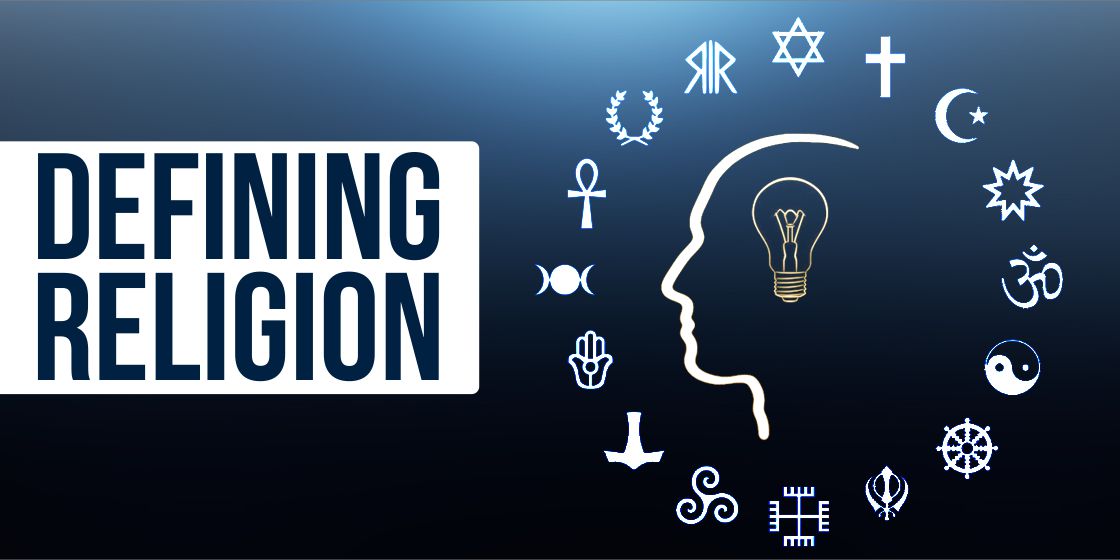
Abstract
Discussing controversial topics such as religion can be quite beneficial provided all parties involved are searching for the truth with an open mind. Perhaps the reason many debates concerning the usefulness and validity of religion bear no fruit, is due to the lack of agreement on a single definition.
This article will help to address this issue by offering a definition of religion unknown to theists and atheists alike. By first examining the numerous definitions that both factions utilize, we learn that even individuals within the same ideological group may not necessarily agree on one clear definition. In order to solve this issue, Professor Roy Clouser’s definition of religion, an unconditional, non-dependent reality, is expounded upon. One benefit would be that an atheist, who according to Clouser’s definition would be religious by way of their adherence to the rules of logic and rationality, cannot simply accuse a theist of believing something without physical evidence, since that accusation would then apply to that same atheist whose belief in logic cannot be proven empirically. The discussion would then be able to progress into a more beneficial direction.
Nowadays, religion is among the most controversial and hotly debated topics. We can find those who strongly support the concept of religion and its need in our daily lives; at the same time, we can just as easily find those who are completely against religion. The trend of going against organized religions is becoming a more and more a popular movement in modern society. Belief in God, prophets and life after death used to be the normal trend, whereby those who did not subscribe to at least these three fundamental beliefs, would be viewed as strange and abnormal. However, there has been a remarkable shift in recent times which has caused this previous tendency and inclination to flip one hundred and eighty degrees. Media personalities, celebrities, politicians, authors, scientists, and other powerful and influential figures, have been constantly attacking the concept of religion to such an extent, that being an atheist or anti-religious is not only accepted, but even seen as the correct view (since it is the rebellious, non-conformist thing to do, although ironically, one is now conforming to this non-conformist movement). Our modern age of mob mentality and cult-like worshipping of personalities has most surely played a big role in this societal change.
However, before this debate is even allowed to take place, which it should, all honest, truth-seeking individuals must at the onset agree to a definition of religion, which they can use as a foundation for their discussions. Every honest, academic, and beneficial discussion normally requires certain preliminary discussions and definitions. Without these initial steps, the two sides of a debate will be talking about two completely different topics, thus never yielding a constructive dialogue for the debaters or for the audience. This article will offer some of the different definitions of religion found both within and outside of religious circles. Due to shortness of time and space, all definitions will not be analysed. Instead, the definition of religion typical among the general masses will be analysed, and then the definition typical among both atheistic and monotheistic scholars. Hopefully at the end, a definition will be investigated which most people may not have heard before, but might prove to be useful. It is hoped that this short piece can be beneficial to those who will engage their friends and family in intellectual discussions about such topics.
Often, people tend towards habit, repetition, and blind obedience. They lack the time, energy, or patience to investigate topics and issues of interest with pure intellectual honesty and academic vigor. It would never occur to the common layperson that, before discussing the topic of religion, perhaps setting a coherent definition would be necessary. Thus, whenever the word ‘religion’ is heard by the average person, there is a customary and typical meaning which comes to mind. The common definition of religion is “a belief in a supernatural and metaphysical reality”. Some might argue that this should be simply stated as believing in God as viewed by the Abrahamic Religions, but that would then force us to cut out belief systems, such as Hinduism, Buddhism, Taoism, Pantheism, Scientology etc., which don’t share the same idea regarding God – whether that be a belief in multiple gods, all of reality being considered a god, or a belief system that has no concept of God at all. Since these are definitely considered religions by the general public, we have to be broader and more general in our definition of religion. Do dictionaries and scholars agree to this definition or has the general public been using this same word with a different meaning? Below are some western dictionary & scholarly definitions of ‘religion’:
Merriam-Webster1:
1. the belief in a god or in a group of gods
2. an organized system of beliefs, ceremonies, and rules used to worship a god or a group of gods
3. an interest, a belief, or an activity that is very important to a person orgroup”
Oxford2:
“The belief in and worship of a superhuman controlling power, especially a personal God or gods”
Penguin Dictionary of Religions (1997)3.
“Religion: A general term used… to designate all concepts concerning the belief in god(s) and goddess(es) as well as other spiritual beings or transcendental ultimate concerns.”
Britannica Concise Encyclopedia (online, 2006)4
“Religion: Relation of human beings to God or the gods or to whatever they consider sacred or, in some cases, merely supernatural.”
Paul Connelly – DARC (Dawnstar Advanced Research Collaborative)5
“Religion originates in an attempt to represent and order beliefs, feelings, imaginings and actions that arise in response to direct experience of the sacred and the spiritual. As this attempt expands in its formulation and elaboration, it becomes a process that creates meaning for itself on a sustaining basis, in terms of both its originating experiences and its own continuing responses. “
Frederick Ferre – Basic Modern Philosophy of Religion.6
“Religion is a way of valuing that is most comprehensively and intensively experienced.”
Based on these few examples and on definitions which have not been listed, it seems that the general understanding of religion in the minds of people is either in agreement with or slightly less encompassing than the different western definitions.
Atheists seem to have a different way of defining religion. Looking at the works of contemporary atheistic scholars, like Richard Dawkins, Sam Harris, Christopher Hitchens, and Lawrence Krauss, reveals that their definitions of religion are typically negative and pejorative. They claim that religion is ‘belief in the irrational’ or ‘that which cannot be proven’. They use their negative definitions to say that religion is evil. Here are some other examples of definitions or concepts of religion from those who don’t support it.
Bertrand Russell7:
“Religion is something left over from the infancy of our intelligence; it will fade away as we adopt reason and science as our guidelines.”
George Santayana8:
“Religions are the great fairy tales of conscience.”
Sigmund Freud in New Introductory Lectures on Psychoanalysis9:
“Religion is an illusion and it derives its strength from the fact that it falls in with our instinctual desires.”
Karl Marx10:
“Religion is the sigh of the oppressed creature, the heart of a heartless world, just as it is the spirit of a spiritless situation. It is the opiate of the people.”
It is not possible to see how the differences in definitions might cause problems when people want to earnestly engage in a healthy discussion about religion. The same type of issue occurs when people try to discuss politics. In the minds of some, politics is a system of governing and controlling resources and providing people with them. Others simply think of politics as a game politicians play by lying, tricking, deceiving, and abusing people in order to secure wealth and power. With these two completely conflicting versions of politics, it is not unusual that people should have a hard time having a peaceful dialogue about it. Likewise, we can see that the differences in defining religion between the common man, dictionaries, encyclopedias, scholars, and atheists will no doubt hinder progress in debates.
What then do Islamic scholars have to say on the topic of defining religion? Are their definitions closer to that of the general public or to the dictionary and scholarly definitions?
Ayatullah Misbah Yazdi (ha) in his book, Theological Instructions, defines religion as follows11:
“In technical terminology, religion means to have a belief in a ‘Creator’ of man and the universe.”
Ayatollah al-Khoei (ra) in Rationality of Islam12:
“Religion (din) is an all-round movement in the light of faith in Allah and a sense of responsibility for the formation of thought and belief, for the promotion of high principles of human morality for the establishment of good relations among members of the society and the elimination of every sort of undue discrimination.”
Allamah Tabataba’i (ra) in Islamic Teachings in Brief13:
“Religion refers to the beliefs and a series of practical and moral instructions that the prophets have related on behalf of Allah to guide and lead human beings.”
(Although this definition seems very limited, in his commentary on the last ayah of Surah Kaafiroon, he seems to imply that religion has a broader definition, which also includes the religion of the polytheistic enemies of the prophet(s).)
Allamah Sayyid Sa’eed Akhtar Rizvi – Need for Religion14
“The Arabic word “Deen” دين which is translated as “Religion” in English is used for several meanings:
(a) “Islam; Belief in unity of God; Worship; Obedience; All the acts of worship; piety;” All these meanings are interrelated and are connected with the belief in Creator.
(b) “Judgment; Reward or Punishment; Account; Order; Law;” These meanings are inter-related and point to the belief in the Life-Hereafter.
(c) The third group of its meanings is: “Custom; character; Habit; Religion revealed and traditional both.’”
The idea behind the word (دين ) “deen” is that man, by his nature, has to have a pattern of life based upon some spiritual ideals or ideas which we call ‘belief’.
It appears that the word دين is more comprehensive than the English word ‘’Religion’’ which puts emphasis on only ‘’Human recognition of super-human controlling power and especially of a personal god or gods entitled to obedience and worship, effects of such recognition or conduct of mental attitude, particular system of faith and worship.”
Thus, we see that even the Muslim scholars have slight differences in their approach to defining religion. Some have kept it limited to believing specifically in Allah and following the message of Islam whereas others expand it to include belief in any type of creator. Based on this, it seems that the common Islamic definition is not as broad as the definitions of the common man, dictionaries or western scholars.
Roy Clouser is professor of philosophy and religion (Emeritus) at the College of New Jersey. In his works, he has examined the definition of religion in a very unique way, which may help solve some of the issues we experience in our daily conversations and discussions. In The Myth of Religious Neutrality, he begins his examination by assessing the different types of beliefs we have in our daily lives in order to distinguish between religious beliefs and non-religious beliefs15:
“What, then, is a religious belief? Consider the question this way. We all have literally thousands of beliefs about thousands of things. At this moment, for example, I believe myself to be the blood relative of certain other people; I believe 1 + 1 = 2; I believe next Friday is payday, that there was an ice age about 20,000 years ago, and that there was a civil war in England in the 1640s. While most people would probably agree that none of these beliefs is religious, the ancient Pythagoreans regarded 1 + 1 = 2 as a religious belief! So we need to know not only what makes one belief religious and another not, but how it can be that the same belief can be religious to one person and not to another.”
Next, he shows the faults of various other commonly held definitions. For example, he says that including belief in a ‘creator’ or the performance of rituals and actions is incorrect; since Buddhism does not believe in a ‘creator’, and Aristotle, though believing in a ‘prime mover’, thought that worship of it was unnecessary and beneath its worth. After having shown the weaknesses in other definitions, he proceeds to define his own. In the view of Clouser, religion is the belief in an unconditional, non-dependent reality.
“I have never found a single religion that fails to hold the divine per se to be whatever is unconditionally, non-dependently real. Please do not misunderstand this point. I am not saying that there are no disagreements whatever about what having divine status means. There are. But they are all disagreements about what else is taken to be true of divinity over and above non-dependence. So even though people may argue about the status of divinity per se, I’m saying that in fact they all agree on non-dependence and only non-dependence. Neither does this mean that every myth or scripture or theology has used the expression “non-dependence” or a synonym for it. Many do, but not all. Some writers speak of the divine as “self-existent” or “absolute” or “uncaused and unpreventable,” or “just there,” for instance. But others simply trace everything non-divine back to an original something the status of which is not emphasized or not explained. In such accounts the original something is therefore left in the role of having non-dependent reality by default: there is nothing it is said to depend on while all else is said to depend on it. Thus it is tacitly awarded non-dependent status. So no matter how little emphasized or tentatively held this point may be, the divine is still being treated as non-dependent so far as the account goes.
A religious belief is a belief in something as divine per se no matter how that is further described, where “divine per se” means having unconditionally non-dependent reality.”
From this point, how should one move forward? Should one continue to use the general definition of religion among the common people or should one the western dictionary and scholarly definitions? Are the viewpoints of the atheists more accurate or those of the Islamic scholars? Can this new definition of Roy Clouser be of any benefit? In the opinion of this writer, in order to defend attacks against religion and to promote a healthy debate, Clouser’s definition of religion is most appropriate. When atheists attack religion, they claim that because we believe in irrational concepts which are based on myths and stories, religion is intellectually inferior. They argue that religion should no longer be a part of society. When Clouser’s definition is used it becomes possible to place atheism in the category of religion as well. One would be able to say, for example, that if an atheist believes that the material world, empirical sciences, and rational thought are the only basis for determining truth, we can categorize that basis as their unconditional, non-dependent reality. Thus, they have certain beliefs and behaviors, which reflect this ‘religious ideology’. At the very least, this might dissuade an atheist from simply attacking the word ‘religion’ itself and rather, start a discussion about what specific issues they have a problem with. Otherwise, one could argue that if someone is blindly following empirical evidences, they too could commit horrible actions like dropping bombs to wipe out innocent civilians and entire cities. Some may argue that this definition of Clouser is more accurately known as worldview and/or ideology. Perhaps this is true, but the point of using this definition, again, is to defend religion against ignorant attacks and to begin a substantive dialogue with other interested parties.
Sayyid Hasan Rizvi
2nd year student, Ameerul Mu’mineen (AS) Islamic Seminary, Qom.
Source: The Qom Student Gazette
References
1. http://www.merriam-webster.com/dictionary/religion
2. http://www.oxforddictionaries.com/us/definition/american_english/religion
3. http://www.fs.cornell.edu/hr/diversity/religion.cfm
4. ibid.
5.http://www.darc.org/connelly/religion1.html
7. Pizzaro, R. (n.d.). Lamp of Harmony (p. 43).
8. Santayana, G., & Coleman, M. (2009). The essential Santayana selected writings (p. 8). Bloomington: Indiana University Press.
9. Freud, S., & Strachey, J. (1965). New introductory lectures on psychoanalysis. New York: Norton.
10. https://www.marxists.org/archive/marx/works/1843/critique-hpr/intro.htm
11. Yazdi, Misbah. Theological Instructions. (p.11)
13. http://www.al-islam.org/islamic-teachings-in-brief-allamah-tabatabai/religion
14. http://www.al-islam.org/need-religion-allamah-sayyid-saeed-akhtar-rizvi/need-religion
15. http://www.metanexus.net/essay/excerpt-myth-religious-neutrality




